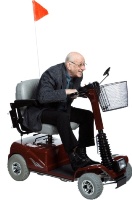 Reduced mobility is arguably one of the toughest parts of aging and sadly almost 40 % of Americans over the age of 84 require a mobility device in order to get around. Immobility is problematic not only because it reduces a person’s independence and freedom but also because it opens the door to a host of other age-related diseases and complications, and often results in further disability.
Reduced mobility is arguably one of the toughest parts of aging and sadly almost 40 % of Americans over the age of 84 require a mobility device in order to get around. Immobility is problematic not only because it reduces a person’s independence and freedom but also because it opens the door to a host of other age-related diseases and complications, and often results in further disability.
Below are three of the most common causes of age-related mobility loss followed by tips on how you can circumvent them.
Advertisement
Cause #1: Bone and Joint Problems
Consuming calcium rich foods such as yoghurt, salmon, almonds and leafy greens can also help to keep your bones and joints strong and consequently reduce your odds for arthritis and osteoporosis. Finally, you should avoid smoking, consume alcohol only in moderation and maintain a healthy body weight.
RELATED READING: Exciting New Migraine Technology
Cause #2: Inflammation
Advertisement
Chronic inflammation can cause joint stiffness, swelling and pain, reduce functional capacity and increase your odds of developing rheumatoid arthritis; all of which will compromise mobility. Inflammation naturally increases with age, and when inflammation is too high, our bodily tissues can begin to break down, including the tissue in our bones and joints that are responsible for mobility. Fortunately, it is possible to reduce inflammation by eating a whole-foods based diet that is high in fruits and vegetables. Omega-3s are also essential when it comes to preventing joint stiffness and subsequent immobility and the richest sources are — walnuts, flax seeds and cold water fish such as salmon, tuna and mackerel. In addition to consuming them in your diet, you may want to talk to your healthcare practitioner about also taking an omega-3 supplement daily. Avoiding junk food and reducing your intake of omega-6 rich foods such as dairy, baked goods, flour products and grains, may also help to keep your inflammatory levels low and increase your mobility.
Cause #3: Pain
Inflammation is the primary cause of pain, and pain is a major cause of immobility, so following the steps in number 2 is essential for preventing pain, obtaining pain relief and maintaining mobility. Unfortunately, the aging process often causes wear and tear on your bones and joints, and the ligaments and tendons that hold your joints together can become stiff; all of which can lead to soreness, pain and subsequent immobility. The old adage “move it or lose it” applies here, because exercise prevents joint stiffness, produces joint pain relief and is essential for maintaining optimal mobility. The recommended exercise regime for increasing mobility includes 30 to 60 minutes of daily cardio exercise combined with regular strength training. It is also imperative to include Yoga, and/or other exercise routines that revolve around stretching because stretching improves the pliability of your ligaments, and thereby reduces joint stiffness and increases range of motion. Finally, if you notice that you are starting to experience joint pain you should address the issue immediately because ignoring it will increase your odds for future immobility. Warm baths, massages and rest can go a long way towards rapid pain relief and optimizing your current range of mobility.
